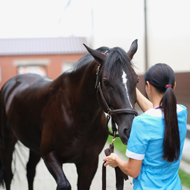Increase in Equine Colic Cases
Winter leads to rise in case numbers.
Vets and Insurers are issuing warnings that horses are at greater risk of colic during winter. Despite recent mild weather, cases are rising and it is expected that owners bringing their horses in for the winter will exacerbate this trend.
Alan Goddard of Cornish Mutual explains: “It is not the cold weather that is the problem; it is the potential change in the management of the animal, because of the change in season.
“For example, if the horse has been outside in a field grazing all summer and is then brought into and kept in the stable for the winter, the change in their feeding or exercise regime could cause problems. If the animal is suddenly fed less fibrous and more concentrate food, this could be a risk factor for colic.”
Equine colic presents as abdominal pain. It often takes the form of minor gastrointestinal or colonic disturbances and surgical intervention to effect repairs is sometimes necessary. Classic signs of colic include excessive sweating, pawing the ground, rolling, looking to their abdomen, lying down and getting up frequently, and not wanting to eat.
Bob Barker, a veterinary surgeon at St David's Equine Practice in Exmouth and Okehampton, has over 30 years veterinary experience in the area. His practice sees an average of three or four cases per week. He expands:
“There are two types of colic - medical and surgical - and the latter can be life-threatening if not treated. Horses are the animal most affected by gut problems and we see more cases when there is a change in nutrition or pasture or they change to new hay too early in the autumn. If, during the colder months, their water freezes and they don’t drink enough or they eat snow that can also be problematic.”
Mr Barker added: “As vets, we are able to assess the degree of pain and other clinical signs. Surgical cases are much more likely to be successfully treated if it is caught at an early stage.
Vets and Insurers are issuing warnings that horses are at greater risk of colic during winter. Despite recent mild weather, cases are rising and it is expected that owners bringing their horses in for the winter will exacerbate this trend.
Alan Goddard of Cornish Mutual explains: “It is not the cold weather that is the problem; it is the potential change in the management of the animal, because of the change in season.
“For example, if the horse has been outside in a field grazing all summer and is then brought into and kept in the stable for the winter, the change in their feeding or exercise regime could cause problems. If the animal is suddenly fed less fibrous and more concentrate food, this could be a risk factor for colic.”
Equine colic presents as abdominal pain. It often takes the form of minor gastrointestinal or colonic disturbances and surgical intervention to effect repairs is sometimes necessary. Classic signs of colic include excessive sweating, pawing the ground, rolling, looking to their abdomen, lying down and getting up frequently, and not wanting to eat.
Bob Barker, a veterinary surgeon at St David's Equine Practice in Exmouth and Okehampton, has over 30 years veterinary experience in the area. His practice sees an average of three or four cases per week. He expands:
“There are two types of colic - medical and surgical - and the latter can be life-threatening if not treated. Horses are the animal most affected by gut problems and we see more cases when there is a change in nutrition or pasture or they change to new hay too early in the autumn. If, during the colder months, their water freezes and they don’t drink enough or they eat snow that can also be problematic.”
Mr Barker added: “As vets, we are able to assess the degree of pain and other clinical signs. Surgical cases are much more likely to be successfully treated if it is caught at an early stage.



 The BEVA has opened two new roles on its Nurse Committee.
The BEVA has opened two new roles on its Nurse Committee.